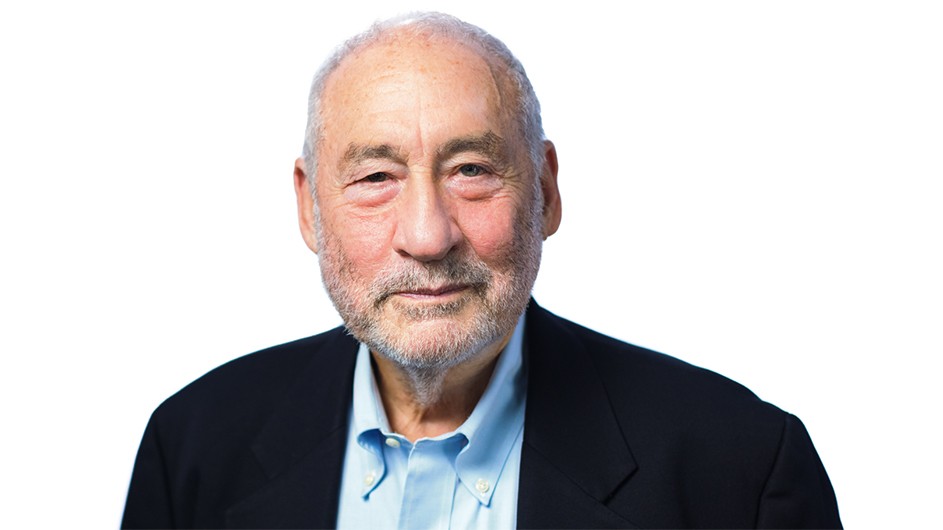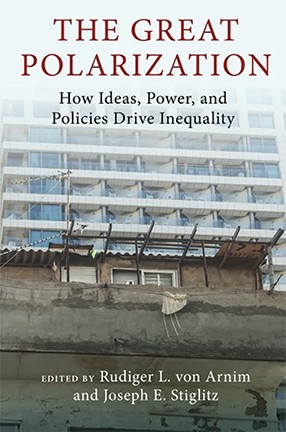Joseph Stiglitz Co-Edits and Contributes to a Book on Growing Inequality
The Great Polarization lays out the issue in stark terms, and outlines potential ways forward.

Inequality of income and wealth have skyrocketed since the 1970s. As the super-rich have grasped the vast majority of the gains from economic growth, labor’s share of income has declined. The middle class has stagnated, and those at the bottom have become even worse off. Persistent structural discrimination on the basis of race and gender exacerbates these economic disparities.
The Great Polarization, co-edited by University Professor Joseph Stiglitz and Rudiger von Arnim, an economics professor at the University of Utah, brings together scholars from disparate fields to examine the causes and consequences of this dramatic rise in inequality. Contributors—including Stiglitz—demonstrate that institutions, norms, policy, and political power (not the natural operation of the market) determine the distribution of wealth and income. The book underscores the role of ideas and ideologies, showing how neoclassical economics and related beliefs have functioned in public debates to justify inequality.
Stiglitz talks about the book with Columbia News, as well as recent books he’s read—and those he’s planning to read—in his fleeting spare time, and the myriad projects that keep him busy.
How did this book come about?
It began with a terrific conference at the University of Utah in 2018 that brought together scholars from different fields who were concerned about America’s escalating inequality. While much had already been written about the subject in the years before the conference—as America’s inequality grew—there was real excitement in the room, as we jointly felt the progress that was being made in our understanding of this problem central to our society.

Can you provide some examples from the book of potential ways forward—strategies for shifting the imbalances of power that have led to this dramatic rise in inequality?
The book is replete with policies that would make a huge difference in reducing inequality. An obvious one: Eliminating the preferential treatment of capital gains, discussed by Julia Ott, a history professor at the New School in New York, in her chapter. A more subtle one: Supporting rather than attacking the unionization of educators. The chapter on this by Eunice Han and Thomas N. Maloney, both history professors at the University of Utah, shows that “by and large, increased unionization of teachers is associated with higher student test scores, and that this association matters more for young students in poorer districts.”
Another chapter by Dean Baker, senior economist at the Center for Economic and Policy Research, deals with reforms to our innovation system, including the intellectual property rules, which would promote innovation, improve health, and reduce inequalities. Baker discusses these rules governing intellectual property, which have played out with a vengeance during the pandemic by allowing Big Pharma to earn tens of billions of dollars while many people in the rest of the world simply couldn’t get the vaccines, tests, and treatments.
What books have you read lately that you would recommend, and why?
I especially enjoyed Pioneer’s Progress, the autobiography of Alvin Johnson, the progressive, early-20th-century American economist who was one of the founders of the New School (an institution established to broaden access to education). I loved Abdulrazak Gurnah’s Paradise. It gave such a vivid picture of German colonialism in East Africa, perhaps particularly poignant to me because of the time I lived in the region a little over 50 years ago.
What's next on your reading list?
I’m in the midst of reading another Gurnah novel, Gravel Heart. On my nonfiction list, I’m particularly looking forward to reading Gary Gerstle’s The Rise and Fall of the Neoliberal Order. I attribute many of today’s problems to the growth of neoliberalism, the idea that markets would take care of everything on their own, and much of my recent work has been about the post-neoliberal economic order. As I mentioned above, Covid-19 has brought home the flaws in our intellectual property regime, so I intend to read Robin Feldman’s book, Rethinking Patent Law.
What are you working on now?
I continue to work on better understanding today’s inequality, and what to do about it: I just sent off to the press a new book, The Origins of Inequality and Policies to Contain It. We’ll never eradicate this inequality, but we can bring it back from today’s outlandish levels. Current inflation is at the center of policy debate, and I’m worried that the Federal Reserve’s response will lead to higher unemployment and more inequality. I’ve just issued a long Roosevelt Institute paper, “The Causes and Responses to Today’s Inflation.”
I’ve continued my theoretical work on growth theory, information theory, financial economics, and climate change (having issued and published several papers recently on each topic). I’ve also been heavily involved in a more practical way to push reforms at the International Monetary Fund, and to help developing countries and emerging markets restructure their debts and get more access to vaccines, treatments, and tests.
What are you teaching in the spring?
Two courses—one is a required class for first-year PhD students, Perspectives on Economics, where we try to give students a broader perspective than they get in some of their more technical courses. Included are discussions of inequality, innovation, discrimination, market power, behavioral economics, and economic crises. The other course is Behavorial Insights into Economic Development, which I’m co-teaching with Karla Hoff.
You're hosting a dinner party. Which three academics/scholars, dead or alive, would you invite, and why?
My wife and I host many dinner parties, and are always looking for new points of view, especially when they touch on public policy. Fortunately, there are many individuals we could invite, such as Adam Tooze and Paul Krugman. If John Maynard Keynes could drop by, that would be great.